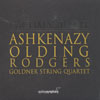Rachmaninov - Rare Rachmaninov
A songful selection of Rachmaninov rarities offers much to enjoy
View record and artist detailsRecord and Artist Details
Composer or Director: Sergey Rachmaninov, Modest Mussorgsky
Genre:
Orchestral
Label: Sydney SO
Magazine Review Date: 10/2009
Media Format: CD or Download
Media Runtime: 0
Mastering:
Stereo
Catalogue Number: SSO200901

Tracks:
| Composition | Artist Credit |
|---|---|
| Romance |
Sergey Rachmaninov, Composer
Dene Olding, Violin Goldner Quartet Joan Rodgers, Soprano Sergey Rachmaninov, Composer Vladimir Ashkenazy, Piano |
| String Quartet No. 1 |
Sergey Rachmaninov, Composer
Dene Olding, Violin Goldner Quartet Joan Rodgers, Soprano Sergey Rachmaninov, Composer Vladimir Ashkenazy, Piano |
| (2) Morceaux de Salon |
Sergey Rachmaninov, Composer
Dene Olding, Violin Goldner Quartet Joan Rodgers, Soprano Sergey Rachmaninov, Composer Vladimir Ashkenazy, Piano |
| String Quartet No. 2 |
Sergey Rachmaninov, Composer
Dene Olding, Violin Goldner Quartet Joan Rodgers, Soprano Sergey Rachmaninov, Composer Vladimir Ashkenazy, Piano |
| Vocalise |
Sergey Rachmaninov, Composer
Dene Olding, Violin Goldner Quartet Joan Rodgers, Soprano Sergey Rachmaninov, Composer Vladimir Ashkenazy, Piano |
| (A) Prayer |
Sergey Rachmaninov, Composer
Dene Olding, Violin Goldner Quartet Joan Rodgers, Soprano Sergey Rachmaninov, Composer Vladimir Ashkenazy, Piano |
| All Nature Sings |
Sergey Rachmaninov, Composer
Dene Olding, Violin Goldner Quartet Joan Rodgers, Soprano Sergey Rachmaninov, Composer Vladimir Ashkenazy, Piano |
| (The) Fair at Sorochintsï, 'Sorochinskaya yarmar, Movement: Gopak |
Modest Mussorgsky, Composer
Dene Olding, Violin Goldner Quartet Joan Rodgers, Soprano Modest Mussorgsky, Composer Vladimir Ashkenazy, Piano |
Author: John Warrack
The Second String Quartet is a more substantial piece of work, or would be if Rachmaninov had completed it. He left part of only two movements, and these have been completed by editors. The Andante is particularly interesting, using, unexpectedly for Rachmaninov, a six-note ground bass on which he builds a powerful structure that, as the insert note suggests, has something of the intensity of The Isle of the Dead. One almost expects him to find room for his beloved “Dies irae” theme. Olding and Ashkenazy have a lot of fun with Rachmaninov’s arrangement of Mussorgsky’s Gopak to round off a a disc of real curiosities.
Discover the world's largest classical music catalogue with Presto Music.

Gramophone Digital Club
- Digital Edition
- Digital Archive
- Reviews Database
- Full website access
From £8.75 / month
Subscribe
Gramophone Full Club
- Print Edition
- Digital Edition
- Digital Archive
- Reviews Database
- Full website access
From £11.00 / month
Subscribe
If you are a library, university or other organisation that would be interested in an institutional subscription to Gramophone please click here for further information.




